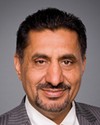Mr. Speaker, I will be splitting my time with the member for beautiful Wild Rose. I appreciate the opportunity to participate in this important debate.
In Canada, we are proud of women in leadership and their roles. We can see that in this House. Especially, we are always exploring ways in which barriers preventing anyone from living to their full potential can be removed. I am very proud that last night I was at a FIFA World Cup game in Montreal. This tournament is happening coast to coast and is a great showcase for Canadians in women's leadership roles. This is one example of women acting as great role models and being a great inspiration to all Canadians.
Unfortunately, there are many young women and girls who are not given the same opportunities. In the most recent Speech from the Throne, our Conservative government committed to ensuring that women and girls would no longer be brutalized by violence, including through the inhumane practices of early and forced marriages on Canadian soil.
I am pleased that our government is focused on strengthening the protection of all women in Canada and Canada's immigration system and on forcefully and resolutely supporting the rights of all Canadian women. In order to do so, the government must ensure that Canada's immigration policies and practices are especially focused on strengthening the protection of immigrant women as well. Indeed, it is deeply troubling that harmful cultural practices such as polygamy and forced and underage marriages still exist as a reality for some Canadian women. That is why I am happy to note the government's proactive approach today toward decreasing the vulnerability of immigrant and newcomer women.
For example, the regulations put in place in recent years have made it much more difficult for people convicted of crimes that result in bodily harm against members of their family or others, particularly violent offences, to support any family class members to come to Canada.
Other measures have been introduced to deter foreign nationals from entering into marriages of convenience to gain permanent resident status in Canada. These measures include a two-year conditional permanent resident status for certain sponsored spouses.
However, to protect sponsored spouses who are in an abusive relationship, our government put in an exception to these measures in instances where there is evidence of any abuse of a physical, sexual, psychological, or financial nature. This exception would also include those who are victims of forced marriage. Better guidelines and training have been introduced to assist front-line officers in processing requests for exceptions based on abuse or neglect and in handling sensitive information related to abusive situations.
As members can recall, the member for Mississauga South introduced a motion last fall to bar the accommodation of proxy, telephone, Internet, and fax marriages for immigration purposes because they may facilitate non-consensual marriages. Our government supported this motion.
While it should be noted that the practice of forced marriage can victimize men and boys, girls and women are more affected by this tradition. Women and girls who are forced to marry someone against their wishes are almost always also beset by a list of other restrictions of their human rights. These are restrictions that deny them education and the opportunity to find employment and place limits on their mobility. These are all against our Canadian values of freedom for all.
Why are immigrant women particularly vulnerable to harm caused by these practices? For one thing, they might not have knowledge of French and English, which can be a barrier to accessing social services and information on their legal rights in an abusive relationship. Some women may also lack the economic independence to leave abusive situations, especially if they are under age.
Under Canada's settlement programs for newcomers, the government also provides funding to a variety of organizations that offer programs and services that respond to specific needs of permanent residents, including immigrant women and their families who find themselves in vulnerable situations.
Also, Canada's citizenship study guide, Discover Canada, and the Welcome to Canada orientation guide are both being updated to reflect the fact that Canada's openness and generosity do not extend to harmful practices such as forced marriage or other forms of gender-based family violence.
Canada's Minister of Citizenship and Immigration devoted a considerable amount of time meeting with representatives of organizations that provide services to immigrant women, and with victims of abuse, at a number of round table discussions across the country. These important discussions focused on domestic violence, polygamy, forced marriages, the immigration process, and how to strengthen the protection of vulnerable women and girls. The result is Bill S-7, the zero tolerance for barbaric cultural practices act.
Canada is a very generous and tolerant country, and we want to keep it that way. I am sure we can agree that Canada's openness and generosity do not extend to underage, forced, or polygamous marriage or to other harmful cultural practices that deny gender equality.
In this country, we do not and should not accept spousal abuse, so-called honour killings, or other gender-based violence. That is why measures in the bill would also amend the Criminal Code to address so-called honour killings and gender-based violence perpetrated against family members, usually women and girls, who are perceived to have brought shame or dishonour to the family.
Under our Criminal Code, someone charged with murder can raise the defence of provocation to obtain a reduction to a lesser charge of manslaughter. Measures in Bill S-7 would amend the Criminal Code so that legal conduct by a victim could not be legally considered a provocation. This would preclude accused murderers, including those involved in honour killings, from trying to reduce the charge they faced by using the argument that a victim's legal conduct provoked them into a heat of passion and that they killed while in that state.
In summary, the measures in Bill S-7 would strengthen our laws to protect Canadians and newcomers to Canada from barbaric cultural practices. The measures in Bill S-7 would improve protection and support for vulnerable individuals, especially women and girls, by rendering permanent and temporary residents inadmissible if they practised polygamy in Canada, by strengthening Canadian marriage and criminal laws to combat forced and underage marriages, and by ensuring that the defence of provocation would not apply in so-called honour killings and in many spousal homicides. That is why this bill is so important.
As legislators, it is our duty to uphold the equality of men and women under the law. I would go so far as to say that this is a fundamental Canadian value. Nevertheless, we must recognize that thousands of Canadian women and girls continue to be subject to violence and that barbaric cultural practices still exist as a reality for many Canadian women.
By supporting these measures and ensuring that they pass into law, Parliament would be sending a strong message that we will not tolerate on Canadian soil any practices that deprive anyone of their human rights. I have no doubt that everyone in this House would agree that in our capacity as representatives of the people of Canada, we have an obligation to always support victims of violence and abuse and to do everything we can to prevent such practices from happening in this country.
Our government is taking steps to strengthen our laws to help ensure that no young girl or woman in Canada becomes a victim of early or forced marriage, polygamy, so-called honour-based violence, or any other form of harmful cultural practice I urge all my colleagues in this House to support Bill S-7.





















